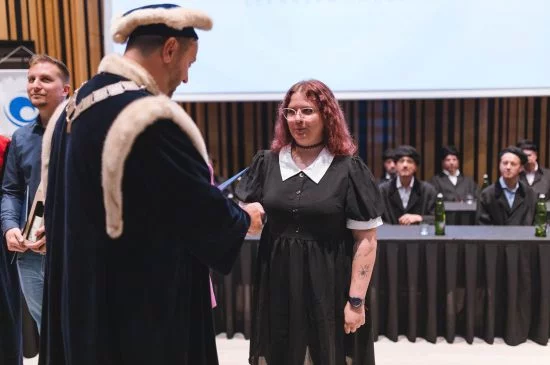"I am mainly glad that my work is beneficial and that I can help people," says Valeria Skopelidou, a graduate of the Faculty of Medicine at the University of Ostrava, who has been nominated for the Government Award
Victory at several student scientific conferences, active participation in grant projects, and a rich publishing and teaching portfolio even during her studies. This is just a brief overview of the achievements of Dr. Valeria Skopelidou, a recent graduate of the General Medicine program at the Faculty of Medicine, University of Ostrava. For her contributions to the field of science, she has been nominated for the 2023 Government Award for a gifted student.
Valeria, how does it feel to hear such praise from all sides and to be nominated by your alma mater for a national award for gifted students?
I don't take it too seriously. I am mainly glad that my work is beneficial, and that I can help people, and that is what truly matters. You can't do this job with the idea of gaining personal prestige. Studying medicine taught me that it's primarily about humility and not having an oversized ego. In medicine, we work as a team, and no one can elevate themselves above others just because they were nominated for an award or won some conferences. Continuous learning is essential, and the government award nomination is just a pleasant bonus. I don't want to get to a point where I think I’m good enough and don’t need to keep improving.
What has your journey to these academic achievements been like?
I moved to the Czech Republic when I was 16—my mother is Greek, and my father is Ukrainian. Both were a great support throughout my studies, and I’m very grateful to them. Initially, I studied radiology in Olomouc. My very first article, which was basically just an adapted version of my bachelor’s thesis, was published in the journal Practical Radiology. Even then, I knew I wanted to study medicine. From the start, I aimed to get into the Faculty of Medicine in Ostrava, which eventually worked out, and I’m very happy here. In Ostrava, I collaborated with my colleague Viktor Procházka on creating the Histology Atlas because I enjoy photography, and I was able to combine my hobby with something useful.
Studying medicine while taking on so many projects must take up a lot of time. How did you manage to balance everything? Did you have any free time for yourself at all?
If you plan everything well, it’s not a problem to have time for a personal life. The first few years of studies were a bit more demanding, but later in medical school, there are more frequent clinical internships, which are scheduled throughout each semester, and it becomes more manageable. I probably had the most on my plate in my fifth year when I was working on several things at once. But once the individual articles were submitted to editors and some of the grants were completed, it got much easier.
